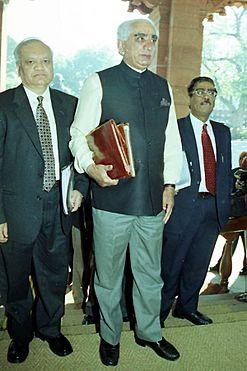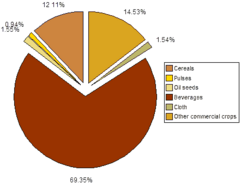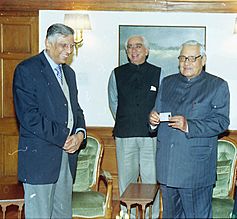Jaswant Singh facts for kids
Quick facts for kids
Jaswant Singh
|
|
|---|---|
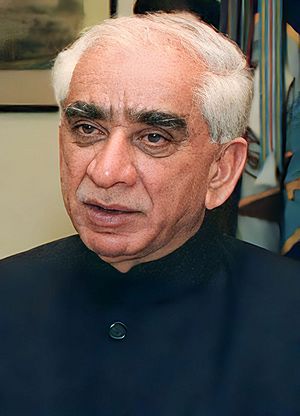
Singh c. 2001
|
|
| Deputy Chairman of the Planning Commission | |
| In office 25 March 1998 – 4 February 1999 |
|
| Prime Minister | Atal Bihari Vajpayee |
| Preceded by | Madhu Dandavate |
| Succeeded by | K. C. Pant |
| Minister of Finance | |
| In office 1 July 2002 – 21 May 2004 |
|
| Prime Minister | Atal Bihari Vajpayee |
| Preceded by | Yashwant Sinha |
| Succeeded by | P. Chidambaram |
| In office 16 May 1996 – 1 June 1996 |
|
| Prime Minister | Atal Bihari Vajpayee |
| Preceded by | Manmohan Singh |
| Succeeded by | P Chidambaram |
| Minister of Defence | |
| In office 16 March 2001 – 18 October 2001 |
|
| Prime Minister | Atal Bihari Vajpayee |
| Preceded by | George Fernandes |
| Succeeded by | George Fernandes |
| Minister of External Affairs | |
| In office 25 March 1998 – 1 July 2002 |
|
| Prime Minister | Atal Bihari Vajpayee |
| Preceded by | Atal Bihari Vajpayee |
| Succeeded by | Yashwant Sinha |
| Personal details | |
| Born | 3 January 1938 Jasol, Rajputana Agency, British India (present-day Rajasthan, India) |
| Died | 27 September 2020 (aged 82) New Delhi, India |
| Political party | Bharatiya Janata Party (until 2014) |
| Other political affiliations |
Independent (2014 – 2020) |
| Spouse |
Sheetal Kanwar
(m. 1963–2020) |
| Children | 2 (including Manvendra Singh) |
| Alma mater | Indian Military Academy Mayo College |
| Awards | Outstanding Parliamentarian Award 2001 |
| Signature |  |
| Military service | |
| Allegiance | |
| Branch/service | |
| Years of service | 1957 – 1966 |
| Rank | |
| Unit | The Central India Horse |
| Battles/wars | |
Major Jaswant Singh (3 January 1938 – 27 September 2020) was an important Indian politician and a former officer in the Indian Army. He was one of the people who helped start the Bharatiya Janata Party (BJP). He served in the Indian Parliament for a very long time, almost continuously from 1980 to 2014.
Jaswant Singh held many important roles in the government. He was a Cabinet Minister under Prime Minister Atal Bihari Vajpayee from 1998 to 2004. During this time, he was the Finance Minister, External Affairs Minister, and Defence Minister. He was the only leader from Rajasthan to hold all three of these major positions.
He was elected to the Rajya Sabha (the upper house of Parliament) five times and to the Lok Sabha (the lower house) four times. After India conducted nuclear tests in 1998, he played a key role in talking with the United States to improve relations. From 2004 to 2009, he was the Leader of Opposition in the Rajya Sabha.
Later in his career, he faced some disagreements with his party. In 2014, he decided to run as an independent candidate in the elections from his home area, Barmer. Because of this, he was removed from the BJP. He passed away in 2020 after a long illness.
Contents
Early Life and Army Career
Jaswant Singh was born on 3 January 1938 in Jasol village in Rajasthan. His family was Rajput. He married Sheetal Kanwar and they had two sons, including Manvendra Singh, who also became a Member of Parliament.
He studied at Mayo College and the National Defence Academy. In 1957, he joined the Indian Army. He served as a Captain in the Central India Horse unit. He fought in the Indo-Pakistani War of 1965 and was a Major during the Sino-Indian War in 1965. After serving for 10 years, he retired from the army in 1966 to start his political journey. He became close to Bhairon Singh Shekhawat and joined the Bharatiya Jana Sangh, which later became the BJP.
Key Moments in His Career
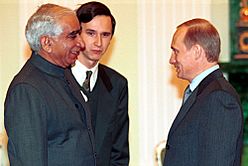
Jaswant Singh held many important jobs in the government led by Atal Bihari Vajpayee. He was the External Affairs Minister and later the Finance Minister. He also briefly served as the Defence Minister.
He was well-known for how he managed India's relationship with the United States. These relations were difficult after India's nuclear tests in 1998. However, Jaswant Singh's diplomatic skills helped improve things, leading to a visit by U.S. President Bill Clinton to India in 2000. His American counterpart, Strobe Talbott, praised his negotiation skills.
Singh faced criticism for his role in the Indian Airlines Flight 814 hijacking incident. He escorted terrorists to Kandahar, Afghanistan, who were released in exchange for the hijacked plane's passengers.
In the 2014 general election, his party did not give him a ticket to run from Barmer. He decided to run as an independent candidate instead. Because of this, he was expelled from the BJP and lost the election.
Political Journey
Jaswant Singh started his political career in the 1960s. He gained recognition when he joined the Jan Sangh. In 1980, he was first elected to the Rajya Sabha, which was a big step in his career.
He served as Finance Minister for a short time in 1996. When Vajpayee became Prime Minister again in 1998, Singh became the Minister for External Affairs. In this role, he managed India's foreign policy and dealt with tensions with Pakistan. In 2002, he became Finance Minister again and worked on economic reforms. He received the Outstanding Parliamentarian Award in 2001.
In 2009, he was removed from the BJP after his book, Jinnah – India, Partition, Independence, was seen as praising the founder of Pakistan. His last major role was as Leader of Opposition in the Rajya Sabha from 2004 to 2009.
He was not given a ticket by his party for the 2014 Lok Sabha elections. He then decided to run as an independent candidate and was expelled from the BJP. He lost that election.
Important Ministries and Work
Jaswant Singh held many important positions in Atal Bihari Vajpayee's government. These included the ministries of Defence, External Affairs, and Finance. He also held roles in Electronics and Science and Technology.
Minister of Finance (First Term)
Singh was the Finance Minister in the first Vajpayee government from May to June 1996. This government lasted only 24 days. During this time, India faced economic challenges due to political instability. After this short period, he was replaced by P. Chidambaram.
Minister of External Affairs
When Atal Bihari Vajpayee became Prime Minister for the second time in 1998, Singh was appointed as the Minister of External Affairs. He was the first person from Rajasthan to hold this important position at the national level. Vajpayee trusted Singh to build good international relations for India.
He represented India during the Kargil War and after India's nuclear tests. He also went to Kandahar after the plane hijack. As External Affairs Minister, he started the first free-trade agreement in South Asia with Sri Lanka. He also improved relations with the US and changed India's military approach to work more closely with Western countries.
Dealing with Nuclear Test Pressure
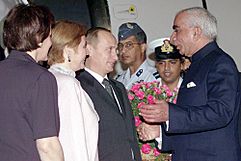
After the BJP came to power in 1998, India conducted nuclear tests, known as Pokhran-II. This was seen as a big move by the government. Jaswant Singh, along with Vajpayee and George Fernandes, played a key role in this. Singh was one of only 12 people who knew about this secret mission.
After the tests, many countries put pressure on India. Canada criticized India, and Japan froze loans and grants. However, the United Kingdom, France, and Russia did not condemn India. The biggest impact was on India's relations with the United States. Singh worked hard to manage America's reactions at the United Nations.
Role in Kargil War
After the Kargil War in July 1999, there was international pressure on India, especially from the United States, which supported Pakistan. Jaswant Singh represented India on the world stage. He gave many interviews and held diplomatic talks with leaders from the United States, China, France, and other nations.
Singh and Vajpayee released a leaked conversation of Pervez Musharraf. In this conversation, Musharraf admitted his involvement in the Kargil attack and his plans against Nawaz Sharif. This helped India's diplomatic position and showed that General Musharraf was responsible for the war. This helped clear India from the allegations of the Kargil War.
Kandahar Hijack Incident
On 24 December 1999, terrorists from the Taliban hijacked Indian Airlines Flight 814 from Kathmandu, Nepal. They wanted India to release some jailed militants. The crisis lasted seven days. India agreed to release three militants: Mushtaq Ahmed Zargar, Ahmed Omar Saeed Sheikh, and Mulana Masood Azhar.
Prime Minister Atal Bihari Vajpayee decided to send Jaswant Singh to Kandahar, Afghanistan, to escort the terrorists and bring back the crew members. Singh made an agreement to exchange the three terrorists for 170 crew members. On 31 December 1999, all 176 people were released and returned to India.
Singh received some criticism for praising the Taliban's cooperation after the hostages were returned.
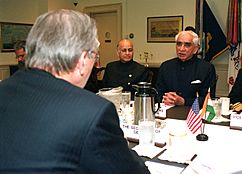
Minister of Defence
Singh became the Defence Minister of India in 2000. This happened after the previous minister, George Fernandes, had to resign. Singh served as Defence Minister until 2001. After that, Fernandes was re-appointed. In 2002, Singh was again appointed as the Finance Minister of India.
Finance Minister (Second Term)
After George Fernandes returned as Defence Minister, Jaswant Singh was appointed as the Union Minister of Finance in 2002. He held this position until 2004, when the Vajpayee government lost the general election. He then passed the role to P. Chidambaram.
During his two years as Finance Minister, he made many market-friendly changes to India's economy. Because of his good leadership, India's economic growth (GDP) was more than 7% each year from 2003 to 2007. Foreign investment increased, and public and industrial facilities were improved. This helped create jobs and grow the high-tech industry. India's economy became one of the fastest-growing in the world during this time.
Important Positions Held
Leader of Rajya Sabha
Jaswant Singh was elected to the Rajya Sabha for the fourth time in 1999. After the Vajpayee Government was formed, he became the Leader of Rajya Sabha on 13 October 1999. He held this position until the government fell in May 2004. During this time, he also served as Minister of Defence and Finance.
Leader of Opposition (Rajya Sabha)
After Vajpayee's government lost power in 2004, Jaswant Singh became the Leader of Opposition in the Rajya Sabha. He held this position for five years, from 2004 to 2009. He worked to strengthen his party, the BJP, especially in states like Gujarat, Madhya Pradesh, and Rajasthan.
During this period, he also served on several non-political committees, such as the "Committee for General Purposes" and the "Committee on Science and Technology, Environment and Forests."
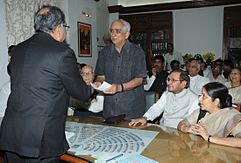
Vice President Candidate
In 2012, Jaswant Singh was the candidate for Vice President for the NDA. He submitted his nomination papers on 20 July 2012. He met with other political leaders to ask for their support. However, he lost the election to Hamid Ansari. Singh received 238 votes (32.69%), while Hamid Ansari received 490 votes (67.31%).
Death
In June 2020, Jaswant Singh was admitted to a hospital in Delhi. He had been in a coma for six years after suffering a serious head injury from a fall in 2014. On 27 September 2020, he had a cardiac arrest and passed away at the age of 82.
His death was marked with great respect and a state funeral. His son, Manvendra Singh, performed his last rites in Jodhpur, Rajasthan, following Hindu traditions. Due to the COVID-19 pandemic, only close family members were present. Prime Minister Narendra Modi expressed his sadness, saying that Jaswant Singh "served our nation diligently, first as a soldier and later during his long association with politics."
Positions Held
- 1980 – Elected to Rajya Sabha (1st term)
- 1986 – Re-elected to Rajya Sabha (2nd term)
- 1989 – Elected to 9th Lok Sabha from Jodhpur
- 1991 – Re-elected to 10th Lok Sabha (2nd term) from Chittorgarh
- 1996 – Re-elected to 11th Lok Sabha (3rd term) from Chittorgarh
- May 1996 – June 1996 – Union Cabinet Minister, Finance
- March 1998 – February 1998 – Deputy Chairman of the Planning Commission
- July 1998 – Re-elected to Rajya Sabha (3rd term)
- December 1998 – July 2000 – Union Cabinet Minister, External Affairs
- February 1999 – October 1999 – Union Cabinet Minister, Electronics
- August 1999 – October 1999 – Union Cabinet Minister, Surface Transport
- October 1999 – Re-elected to Rajya Sabha (4th term)
- March 2001 – October 2001 – Union Cabinet Minister, Defence
- July 2002 – April 2004 – Union Minister, Finance & Company Affairs
- April 2002 – May 2004 – Union Cabinet Minister, Finance
- 2004 – Re-elected to Rajya Sabha (5th term)
- 2004 – Leader of Opposition, Rajya Sabha
- 2009 – Re-elected to 15th Lok Sabha (4th term) from Darjeeling
Books Written by Jaswant Singh
- National Security (1996)
- Defending India (1999)
- District Diary (2001)
- Travels in Transoxiana (2006)
- In Service of Emergent India (2007)
- Till Memory Serves: Victoria Cross Winners of India (2007)
- Khānakhānā nāmā (2006)
- Conflict and Diplomacy: US and the Birth of Bangladesh, Pakistan Divides (2008)
- Jinnah: India, Partition, Independence (2010)
- The Audacity of Opinion (2012)
- India at Risk (2013)
- Antarctica (2011)
See also
 In Spanish: Jaswant Singh para niños
In Spanish: Jaswant Singh para niños
- List of Rajputs
- Ministry of Defence
- Ministry of External Affairs
- Ministry of Finance
- Manvendra Singh
- Outstanding Parliamentarian Award
- Jinnah: India, Partition, Independence
- Bharatiya Janata Party
- Deputy Chairman of the Planning Commission
- Leader of Rajya Sabha
 | Misty Copeland |
 | Raven Wilkinson |
 | Debra Austin |
 | Aesha Ash |


